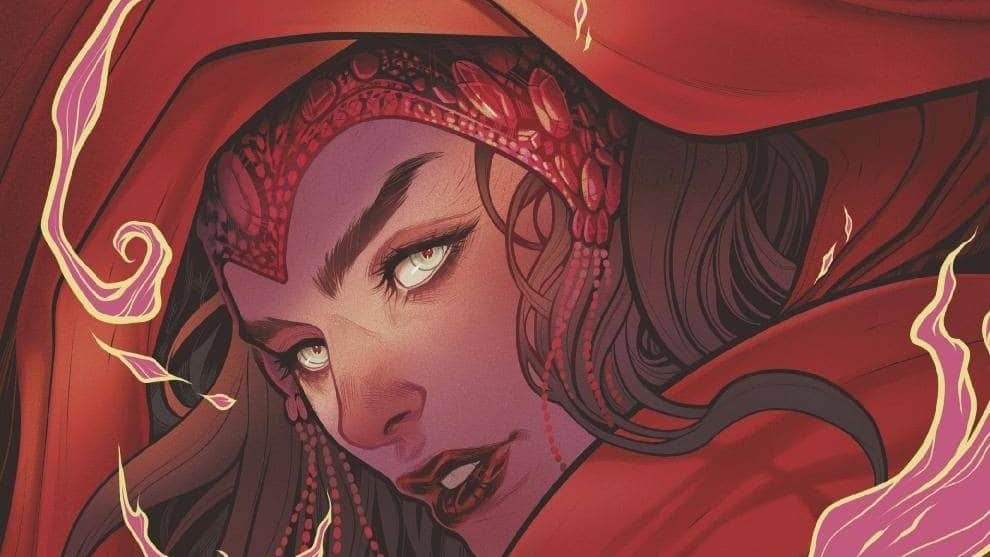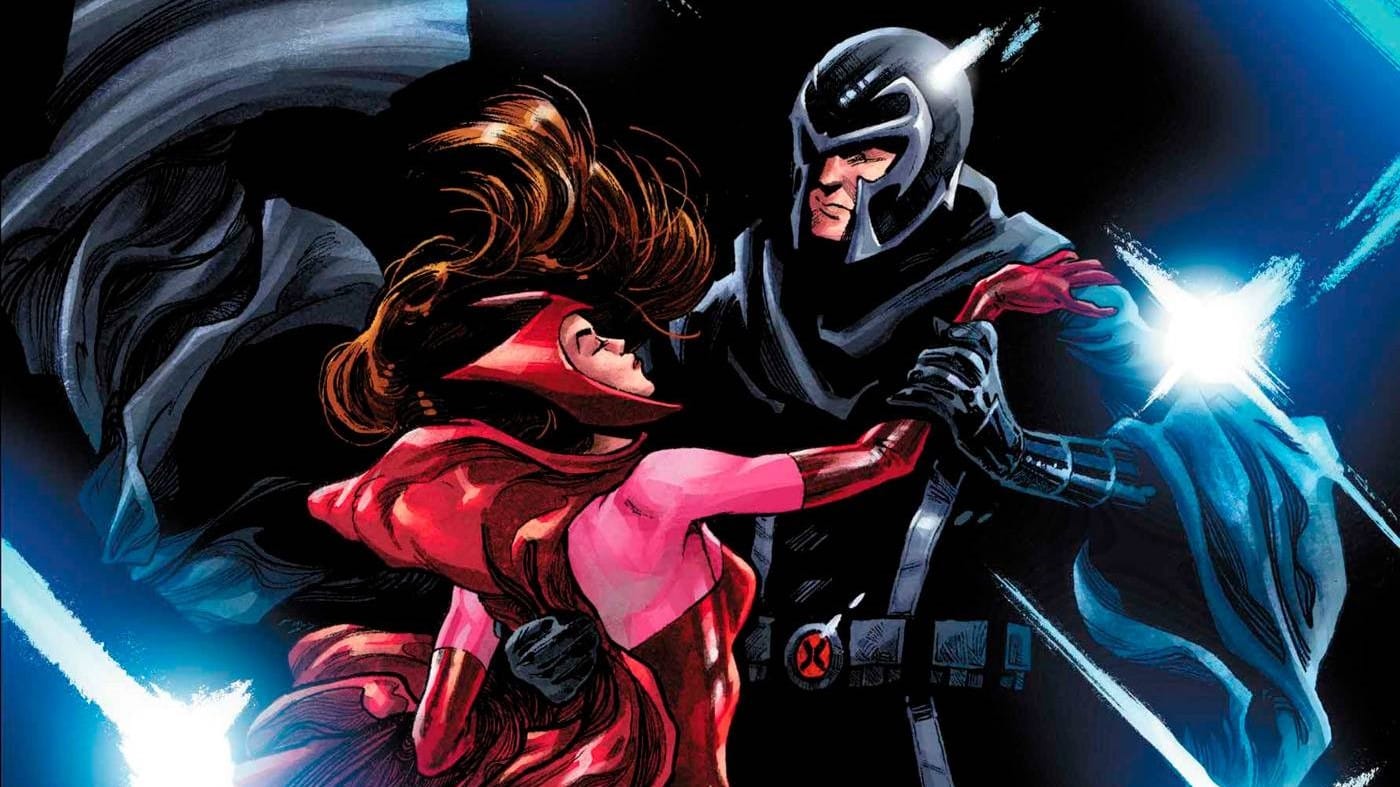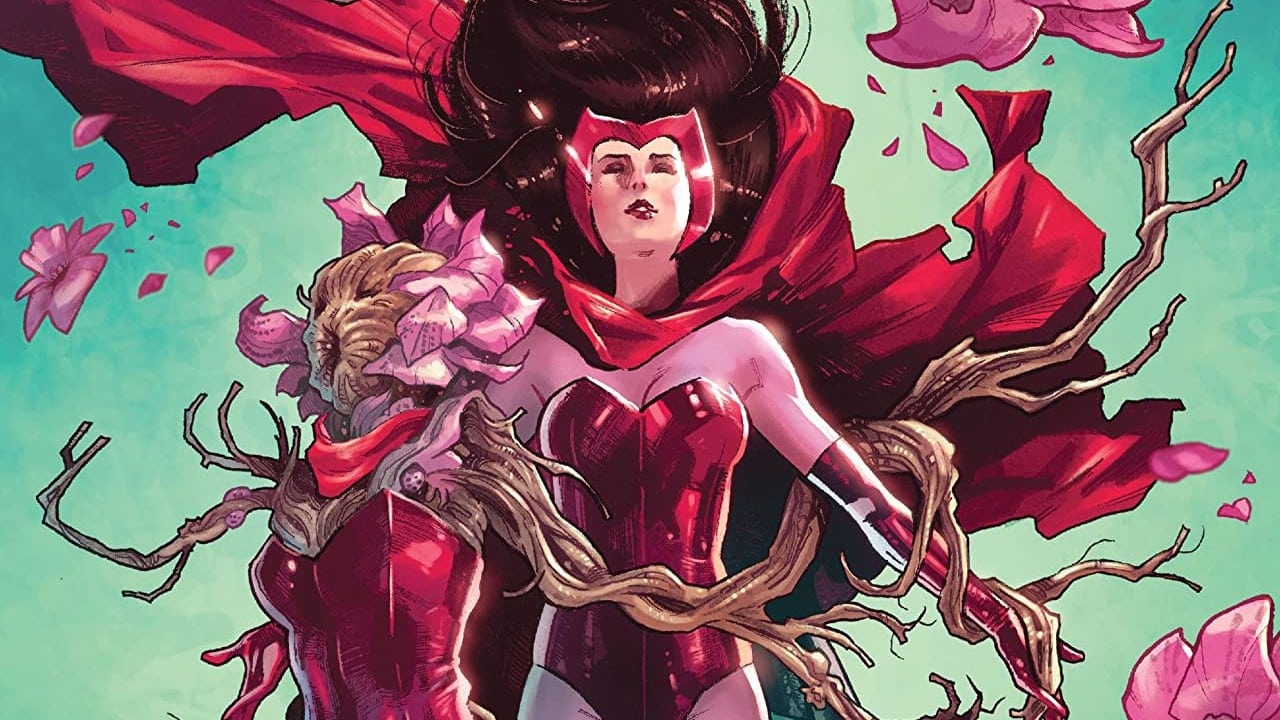Once upon a time, The Scarlet Witch, The Pretender Wanda Maximoff, was the daughter of Magneto. She’s been evil and an Avenger. She is now dead. Leah Williams, Lucas Werneck, Joe Caramagna and Edgar Delgado examine her fate in X-Men: The Trial Of Magneto #1.
Charlie Davis: Well. It’s here. I don’t know about you, Andrea, but this is a comic that I’ve been really looking forward to since it was announced, especially since the focus of the series became very clear in the last issue of X-Factor. Wanda is a decisive figure both in Krakoa and out of it in the metaspace, and boy, oh boy, am I ready to talk about it.
Andrea Ayres: Charlie, I have to say I am so excited to write with you. It is an honest to goodness pleasure. I have been sitting on my hands waiting for the first issue of The Trial of Magneto, and here we flippin’ are. Let’s do it, to it.
A Crime Scene Investigation

Charlie: You know, the first thing that sticks out to me, and has always stuck out to me in Leah Williams writing, is her ability not only to juggle a large cast and make the individual character beats matter but her ability to imbue a concept that has the potential to be too dense with honest to god life. And I’m not even saying that for the obvious pun.
I wanted to take a moment before we dive into the meat of what is going on here just to say that a lot of the Krakoan X-Books to me have felt, at times, devoid of personality. Characters exist just moving along parts of the plot but are not necessarily concerned with upholding their character traits or continuity at some points. Leah’s books have never felt like this, and X-Factor was the richest character book in the line. I am so excited to get these characters back and include others in a situation that is hard to deal with emotionally. The exploration of different characters exploring grief here is amazing.
Andrea: I remember listening to Leah Williams on the Battle of the Atom podcast before X-Factor started, and the way she explained her plans for the protocols gave me pause. I recall thinking to myself, I don’t know how that will work out without feeling overwhelming. I ate my hat on that one because it did.
I’m going to pick up on what you said about some of the Krakoa-era books. There are times I struggle to keep the characters straight because they feel like one-dimensional cardboard cutouts. I’ve felt a disconnect between the emotionality of the art aligning with the script seamlessly. Thankfully we’ve got Lucas Wernek and Edgar Delgado on board with Trial. They are well suited to the way Williams writes. She invests deeply in stories she feels comfortable telling, she feels ownership telling, and because of that, there’s an ease with the language. It’s not overwrought. It’s allowed to naturally flow the way honest human-to-human dialogue does using shorthands and not always making sense.
Charlie: And that’s ultimately what this story is about. The humanity of a group of people who have tried to elevate themselves above certain aspects of that. The cold alien nature of what’s going on with some parts of Krakoa has been a turn off for some, and I’d honestly been dying for that same callousness expressed in the text to have consequences for someone and something.
The Wanda question has been floating around for a while now and her literal demonization by mutants was a bomb waiting to go off. I didn’t expect we’d end up here, but some of these sequences in this issue hit me like a ton of bricks. The literal celebration of a loss of life by what seems to be a majority of mutants…it was kind of horrifying to see even if I was expecting it. That juxtaposed with the very real grief felt by individual characters was such a good illustration of what happens when you cease to be a person in the eyes of a greater group of people. The blatant dehumanization certainly struck a chord with me, but it has been since this era began.
Andrea: Hrm, something you said there, Charlie, makes me think about the beginning of the issue. Williams knows many readers have a less than charitable view of Wanda. I can’t help but feel that she asks readers to reckon with their feelings about the Scarlet Witch as Rachel chronoskims to find out what occurred the night of Wanda’s murder. We see Wanda running away in terror. We see her heels dig into the soil, kicking up dirt and grass from the force of her resistance. There’s a sort of visceral physicality to those images, which are difficult to see. Williams is reminding us that this was someone.
Those who would celebrate the loss of her life must also deal with the horrific details articulated to the reader in a very crime scene TV procedural manner. If I had my druthers, I’d guess that Williams is poking holes in the way people try to distance themselves from death, the way we dehumanize and dismantle how close we all are to it at all times. The gory details hit me differently because of the absolute horror on Trevor’s face. A great example of this is on page nine, that entire panel sequence. Ouch. I can’t forget to mention the gorgeous splash page, either. The use of foliage as we trace our way through different characters’ emotional states is beautiful. It’s a real credit to Wernek and Delgado.
Charlie: I was thinking the exact same thing, Andrea. Upon a first read, I found myself puzzling why we would be spending so much time on something that felt like a crime procedural. The use of autopsy imagery and the repeating of details of the murder felt grim. Then I realized what the art and details are meant to be doing—grounding this all in something real—making it uncomfortable for people who would so quickly brush this off. Some of these characters can’t brush off this death. This leads me to the other stand out element of this issue. Magneto.
The Magnetism of Grief

Andrea: We are now circling back to the almost glee that seems to have taken over many mutants as they learn and celebrate Wanda’s death. The glib, dismissiveness to the way Mister Sinister throws it all in Magneto’s face as he waits to hear if the Quiet Council will resurrect his daughter, was painful to me.
Then we get the decision; there will be no resurrection. Erik blows up and storms out (after Mystique implies he murdered his daughter), where we see the celebrations. These story beats are where Williams shines for me. If she understands anything about mutants, about people, it’s that they are freaking complicated. Very few are all good or all bad. And how we come to view specific mutants as worthy of redemption or not well, that’s a whole sociological writing experiment that I don’t think we have the time for right now… The point is, pain causes people (and mutants) to act in absolutely mystifying and unpredictable ways. Grief hurts. Hell, it’s a body blow, and that’s what we’re getting layered in the first issue.
Charlie: If the scene of thousands of mutants celebrating the death of someone wasn’t disturbing enough, some of the thoughts at play in the council conversation about resurrecting Wanda should be. If your memories make up a portion of who you are, things you’ve learned and ultimately are what shape you, the thought of someone being able to revert you to an earlier copy, should be. That part of the resurrection process has always made me squint my eyes, but most of the books shy away from actually touching on how anyone is supposed to feel about that. There is a palpable unease displayed in that scene, layered with grief, fear and anger. It’s an incredible masterwork of dialogue and character that Williams seems to excel. In my opinion, Magneto is the stand-out character here, but the panels of Lorna’s face in the background in some of these scenes add another layer on top.
Not to mention Pietro…
Andrea: The first issue of Trial of Magento demonstrates how unique our response to grief is better than other superhero comics. Some act from a place of anger; others are numb; some collapse in stunned horror. We see all these on display, from Vision to Pietro. Pietro isn’t filled with rage, at least not by my reading. The anguish fills him, as it does Vision and Lorna. It’s not only the loss of Wanda. It is the weight of being tied to Magneto. There’s always a cost. Tears stream down Lorna’s face as she talks to Erik about being “rearranged” to be in the mold of a perfect daughter. I think it’s interesting to reflect on being rearranged in light of what you said about resurrection. If you are reverted to an earlier copy, aren’t you being rearranged too? It is sometimes hard to imagine anyone here has the moral high ground, and that’s probably the point.
Charlie: That is absolutely the point. The horror of loss, the empty feeling you can still have in a community of people who have touted themselves as better than the rest. I think the issue serves as a reminder that there are just some things you can’t escape and bringing death to Krakoa was a great choice to push the gravity of it all back onto people who have seemingly transcended it. Pietro and Tommy’s reactions have really stuck out to me, with Tommy not being able to reach his brother, maybe one of the most heartbreaking things I’ve read this year. [Ed. note: He is busy helping his husband stop a space invasion.]
Andrea: Absolutely. Tommy’s face hit me hard. For those of us who have good relationships with siblings, being near them in times of hardship feels like a necessity. It’s an aching to be close. That’s what it was for me anyway when my sister called to tell me my mom had passed. Not having the ability to be near my twin or immediate family at that exact moment compounded the feeling of being alone, which exacerbated the loss of our mother. All you have is your grief as a blanket, and that’s cold comfort. Something Pietro says as Northstar embraces him is worthy of note as well. “She was just unwell. (…) She just needed some (expletive) compassion for once.”
As I deal with mental illness, I consider what compassion looks like for me. How does it look or feel? I struggle with this question. What I do know is I don’t want my loved ones to try to fix me. I just need them to be there, to listen, to hold me. To hold me both physically, in loving compassion, but also help to hold me accountable. Williams wants the reader to ask themselves what we owe one another given that we are all miserably flawed, hopelessly flawed humans?
Charlie: Pietro’s line was so real. It grounded so much. Wanda did just need some compassion. Some empathy. SOMETHING for once for being mistreated so much by not only characters in this world but by the male writers who overwhelmingly drove her stories for decades.
Andrea: BLESS. The celebration around Wanda’s death feels like a call out to which mutants get to be forgiven and which don’t. And wouldn’t you know it, there’s a big ol’ honking gender dynamic to that. I could go on, but that’s an entirely separate piece.
Grief is a Knifing Wind

Andrea: I can’t imagine a better way of explaining grief. As the first issue closes, we’re left visiting different locations and mutants dealing with loss in their private way. At first, it is unclear who is providing the monologue to grief, and then we see it is Wanda. What did you think about the reveal?
Charlie: I really enjoyed it. Even if she was murdered and we are exploring everything that that entails, this needs to be Wanda’s story. She has played second fiddle in her own stories for years, if not decades, at this point, and frankly, it needs to stop. This feels good. She is such a powerful being, and it makes sense with the nature of chaos magic that at least part of her would have slipped off into some other state or plane. She needs to have a voice in this story, even if she’s dead. I thought it was nice and very fitting.
Andrea: I felt similarly. I wasn’t entirely sure about the American Beauty-esque splash page, as the film is irrevocably tainted. Yet, now I can’t stop wondering if that’s either a red herring or a foreshadowing. Wanda says, “I died, but I am not dead.” That Wanda is getting more agency in her death than she had in life is an incredible condemnation of how past writers have treated her. Wernek and Delgado’s have a clever bit of work here (if the story plays out like I imagine it might).
In the last image of Wanda, flowers envelop her. The blood has turned into red roses, a contradiction to the horror of her violent murder. Is death beautiful? We know it is not. We’ve just seen thirty-odd pages for what Wanda’s death was horrible. So the closing pages of Trials are more jarring than they might have been had they foregrounded the issue. So, is this a reclamation or something else? Is this the red of blood, death, lust, love? I guess it depends on who the murderer is.
Charlie: The juxtaposition is striking, but I believe it implies exactly what you stated it might, a red herring or perhaps even the grim realization that for Wanda, maybe death is, even in a brief moment, more beautiful than life. I often say that in fiction, there are things that can happen to characters that are much worse than death. Perhaps the whole of the issue illustrated that and the art was meant to push that idea even further at the end. Either way, I cannot wait to see more.
X-Traneous Thoughts

- I will never, ever stop loving Wernek’s work on clothing and Delgado’s colors are perfectly suited (Lorna’s clothes, please and thank you)
- Data page asks, “Where am I?” The use of green and brown stood out to me; we don’t often see color in the data pages
- What’s the over-under on whether or not Magneto is guilty? Do we have one?
- I don’t for a moment believe he’s the culprit. I smell a setup.
- Krakoan Reads: AVENGERS ASSEMBLE






